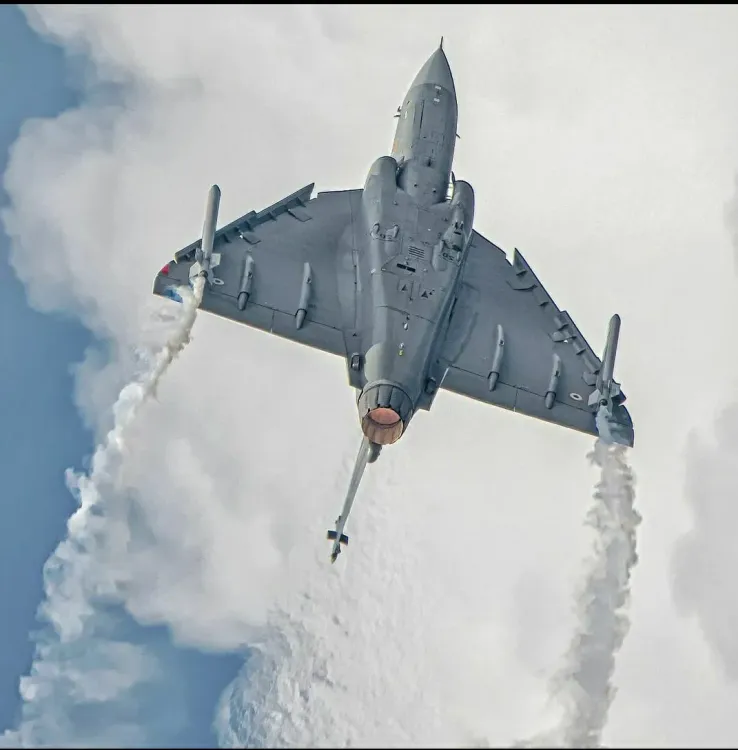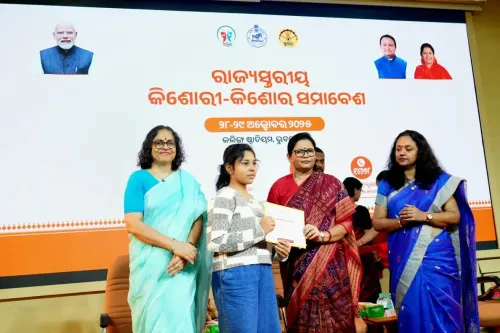DRDO Successfully Completes High-Altitude Testing of Indigenous ILSS for LCA Tejas

Synopsis
Key Takeaways
- Successful high-altitude testing of ILSS for LCA Tejas.
- 90% indigenous content enhances self-reliance.
- Real-time oxygen generation improves pilot endurance.
- Collaboration among multiple defense entities.
- Supports India's vision of 'Viksit Bharat 2047'.
New Delhi, March 5 (NationPress) The Defence Research and Development Organisation (DRDO) has triumphantly completed high-altitude evaluations of the indigenous Integrated Life Support System (ILSS) designed for the LCA Tejas.
The ILSS is an On-Board Oxygen Generating System (OBOGS). DRDO announced that the OBOGS-based ILSS is a state-of-the-art system engineered to produce and manage breathable oxygen for pilots during their flights, thereby eliminating reliance on conventional liquid oxygen cylinder systems.
Experts are optimistic that this innovation will guarantee real-time oxygen production, significantly improving pilot endurance and operational capability.
This system is produced by L&T as a Development cum Production Partner.
The Ministry of Defence (MoD) has stated that this development signifies a vital partnership between DRDO and Indian defence manufacturers.
Importantly, the ILSS boasts a remarkable 90 percent indigenous content, promoting India’s self-sufficiency in aerospace technology. With suitable modifications, this system can be adapted for the MiG-29K and other aircraft.
The Defence Bio-Engineering and Electro Medical Laboratory (DEBEL), located in Bengaluru and operating under the DRDO, carried out the trials on March 4.
The MoD reported on Wednesday that the Integrated Life Support System (ILSS) underwent comprehensive testing on the LCA-Prototype Vehicle-3 aircraft developed by Hindustan Aeronautics Limited (HAL) / Aeronautical Development Agency (ADA), fulfilling rigorous aeromedical standards across various flight scenarios, including altitudes reaching up to 50,000 feet above mean sea level and high-G maneuvers.
“Performance assessments focused on critical parameters such as oxygen concentration, demand breathing, and the availability of 100 percent oxygen, alongside aerobatic maneuvers at the required altitudes for comprehensive functional assessment of the Anti – G Valve. The Breathing Oxygen System (BOS) was evaluated during taxiing, takeoff, cruising, G turns, rejoining approaches, and landing. Following clearance from the Centre for Military Airworthiness and Certification (CEMILAC), the system successfully fulfilled all established criteria. Beyond OBOGS, the ILSS incorporates 10 Line Replaceable Units, such as the Low-Pressure Breathing Regulator, BOS, Emergency Oxygen System, Oxygen Sensor, Anti-G valve, and various advanced components,” the MoD clarified.
This significant achievement has been realized through the joint efforts of DEBEL, ADA, HAL, CEMILAC, the National Flight Test Center, Directorate General of Aeronautical Quality Assurance, and the Indian Air Force (IAF).
Defence Minister Rajnath Singh has extended his congratulations to DRDO, the Indian Air Force, industry collaborators, and Public Sector Undertakings for this accomplishment.
He underscored that this advancement underscores India’s dedication to pioneering defence technologies and aligns with the vision of ‘Viksit Bharat 2047’.
Chairman DRDO Dr Samir V. Kamat also commended the DRDO team, the IAF, and industry partners for their contributions to the successful high-altitude trial of the Indigenous ILSS for LCA Tejas.







